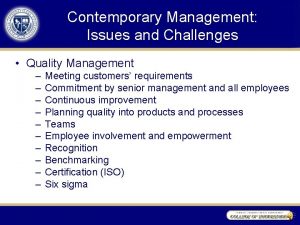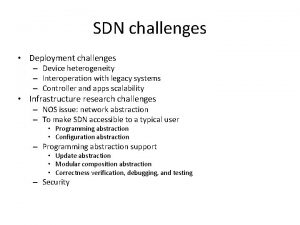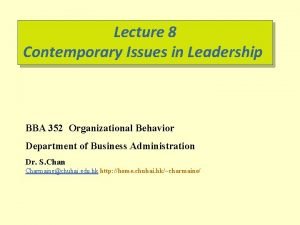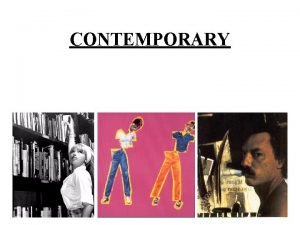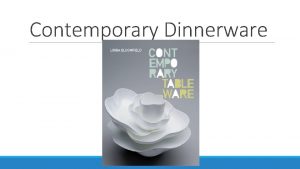Contemporary Management Issues and Challenges Quality Management Meeting










- Slides: 10

Contemporary Management: Issues and Challenges • Quality Management – – – – – Meeting customers’ requirements Commitment by senior management and all employees Continuous improvement Planning quality into products and processes Teams Employee involvement and empowerment Recognition Benchmarking Certification (ISO) Six sigma

Contemporary Management: Issues and Challenges • Customer Focus – CASA/SME CIM Wheel

Contemporary Management: Issues and Challenges • Information Technology – – Computers and Microprocessors Internet Engineering Functions: Design, Manufacturing Business Practice: Supply Chain, e-Business • Project Management – Complex systems – Dynamic • Globalization

Contemporary Management: Successful Executives • Chester Barnard (telecommunications executive) – Functions of the Executive • Alfred P. Sloan (GM) – Annual styling changes – Pricing structure • Walt Disney (Walt Disney) – Treating customers as “guests” • Thomas Watson Jr. (IBM) – Service – Customer satisfaction

Contemporary Management: Successful Executives • Admiral Zumwalt (Navy) – “People will respond well to being treated as grownups” • Bill Hewlett & Dave Packard (HP) – Management by walking around • Sam Walton (Walmart) – Driving costs out of the merchandising system • Bill Gates (Microsoft) – Range of products • Jack Welch (GE) – innovative management strategies and leadership style

Contemporary Management: Famous Authors • Peter Senge – The Learning Organization • • • Systems thinking Personal mastery Mental models Building shared vision Team learning

Contemporary Management: Famous Authors • Steven Covey – The Seven Habits of Highly Effective People • • Habit 1: Be Proactive: Principles of Personal Vision Habit 2: Begin with the End in Mind: Principles of Personal Leadership Habit 3: Put First Things First: Principles of Personal Management Habit 4: Think Win/Win: Principles of Interpersonal Leadership Habit 5: Seek First to Understand, Then to be Understood: Principles of Empathetic Communication Habit 6: Synergize: Principles of Creative Communication Habit 7: Sharpen the Saw: Principles of Balanced Self. Renewal

Contemporary Management: Famous Authors • Tom Peters – In Search of Excellence: Lessons from America's Best Run Companies • • 1) A bias for action, 2) Staying close to the customer, 3) Autonomy and entrepreneurship, 4) Productivity through people, 5) Hands-on, value driven, 6) Stick to the knitting, 7) Simple form, lean staff, and 8) Simultaneous loose-tight properties.

Contemporary Management: Famous Authors • Michael Hammer – Re-engineering the corporation • Scott Adams – Dilbert comic strip • Michael Porter – Strategic Management and Strategy Theory • Peter Drucker – Management By Objectives • Thomas Friedman – The World Is Flat: A Brief History of the Twenty-First Century

Discussion Questions 1. Compare the impacts of Industrial Revolution with the “Information Revolution”. 2. Could you identify some other issues and challenges faced in today’s engineering management fields? 3. Could you identify some other famous authors who are influencing management practices of today?
 What are contemporary management issues
What are contemporary management issues Ppt index
Ppt index Contemporary issues in tourism meaning
Contemporary issues in tourism meaning Nursing round definition
Nursing round definition Big data: issues, challenges, tools and good practices
Big data: issues, challenges, tools and good practices Sdn issues and challenges
Sdn issues and challenges Economic challenges facing contemporary business
Economic challenges facing contemporary business Travis iceberg model of wellness
Travis iceberg model of wellness Ocr sports studies
Ocr sports studies Contemporary leadership issues
Contemporary leadership issues Contemporary issues in marketing
Contemporary issues in marketing
